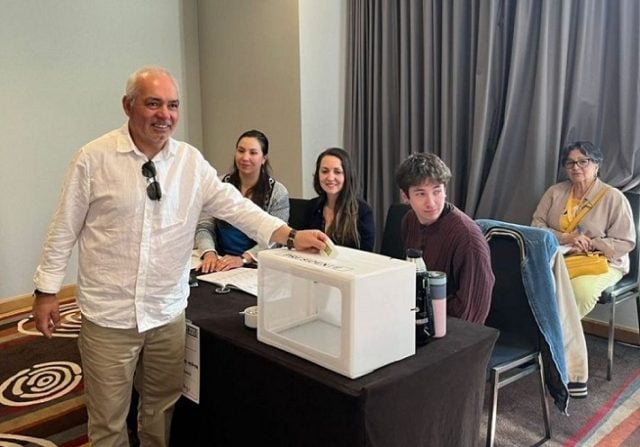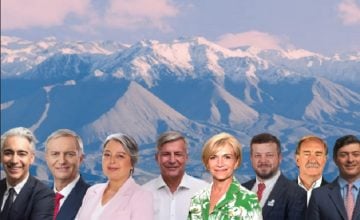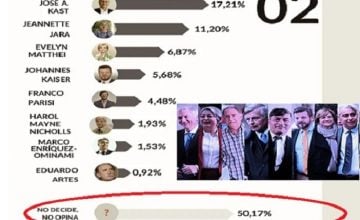Original article: Análisis de las Elecciones Presidenciales y Parlamentarias en Chile: La ultraderecha avanza a paso firme
“Behind every rise of fascism
there is a failed revolution”
Walter Benjamin
By Javier Pineda Olcay, Director of El Ciudadano
In these presidential elections, Jeannette Jara takes the lead with 26.8% of the votes, closely followed by José Antonio Kast, who garnered 23.9%. Franco Parisi, the candidate from the People’s Party (PDG), surprises by reaching 19.7%. Johannes Kaiser failed to challenge Kast effectively, landing at 13.9%, while Evelyn Matthei emerges as the major loser with only 12.5%. Both Matthei and Kaiser have announced their support for Kast, while Parisi has left his supporters free to choose, positioning Kast favorably for the upcoming presidential runoff.
The independent candidates Harold Mayne-Nicholls (1.3%), Marco Enríquez-Ominami (1.2%), and Eduardo Artés (0.7%) collectively represent just over 3%, marking the worst performance for the left and center-left in contemporary Chilean history, failing to surpass 30% of the electoral roll.
In the National Congress, the right (34 seats) and the far right (42 seats) will hold an absolute majority in the Chamber of Deputies, but they will not achieve the four-sevenths quorum necessary for constitutional reforms. They would need to rely on the PDG, which holds 14 seats.
In a surprising twist, the Senate remains evenly split. The right (18 seats) and far right (7 seats) total 25, while the center-left also gains 25 seats (22 officialists and 3 independents).
1.- Jeannette Jara Wins First Round, but falls short of expected results. A good outcome would have been approaching the 38% garnered by the Apruebo in the referendum for the first constitutional process, or having a lead of more than 10 percentage points over the candidate moving on to the runoff. Instead, just 26.8% of the votes were secured, and with the additional votes from Mayne-Nicholls, MEO, and Artés, the total only reaches about 30%.
This indicates that to win the second round, Jara will need to attract votes from Franco Parisi and part of the historical support from the Concertación that backed Evelyn Matthei. The votes for the candidates are not completely transferrable, and the aggregates from the first round cannot be mechanically summed for the second. However, given these results, the presidential runoff looks challenging for Jeannette Jara.
Jara’s candidacy has been perceived—as much as efforts were made to differentiate in recent weeks—as a continuation of Gabriel Boric’s government, achieving results similar to the approval ratings of that administration. This continuity has become a burden, as despite strong macroeconomic figures, the government has not implemented the transformative changes it promised during Boric’s presidential campaign. This has led to significant disillusionment among the population, exacerbated by the right’s cultural battle portraying the country as economically and socially crumbling, amid a lack of governmental support for a media ecosystem to counter this narrative, allowing it to take strong root in public sentiment.
This suggests that for the second round, Jara must transcend the narrative and measures adopted by Boric’s government, embracing popular ideas from Franco Parisi and other candidates. A potentially pivotal proposal to rally these voters is the «anti-inflationary pension fund withdrawal,» intended for debt repayment, down payments on homes, or entrepreneurial ventures upon retirement. If Jara’s candidacy remains a defender of the status quo established by the current government, it is destined to fail.
2.- José Antonio Kast Dominates the Far Right Sphere and the broader right. Recent polls predicting a «three-way tie» were proven wrong. Kast maintained a solid second place with over 3 million votes, representing 23.9% of the ballots cast.
Johannes Kaiser finished with 13.9%, trailing by 10 points, while Evelyn Matthei fell even further back, securing only 12.5%. Both candidates expressed their support for defeating the “communist candidate,” despite vocal reservations from members of Evopoli and the liberal right within Chile Vamos, who labeled Kast a danger to democracy in the run-up to the election.
The election results indicate that many voters who backed Chile Vamos parliamentarians also voted for José Antonio Kast, reflecting a parliamentary list comprising Kast and Kaiser that captured nearly 25% of the votes, despite their combined presidential vote being closer to 40% of the electoral roll.
3.- Franco Parisi Surprises with Stronger Performance than Expected. This is Parisi’s third election, presenting again with the People’s Party. In this election, he received 19.7% of the votes, surpassing 2.5 million. Parisi won in several northern regions of the country and placed second in the Central Valley. His vote share in the Metropolitan Region was the lowest compared to other regions. This time, he also effectively transferred votes to his parliamentary list, which elected 14 deputies.
At the campaign’s start, he attempted to emulate Javier Milei with a chainsaw and made his sister a central figure. However, noticing that space was occupied by Kaiser, he shifted to a “desideologized populist” campaign, blending social policies like funding for public education and ending waiting lists with authoritarian approaches on migration and crime. Additionally, by aligning with Pamela Jiles, he sustained a policy for “pension fund withdrawals” aimed at debt repayment. His slogan “neither fascist nor communist” resonated with a largely depoliticized electorate.
In the previous presidential elections, he backed Kast in the second round; however, his supporters predominantly leaned toward Boric. In this election, he adopted a critical stance against the elite and “cuicos,” being more critical of the right-wing candidates than of Jara, acknowledging her history of hard work. Until now, he has allowed his electorate freedom of choice.
4.- The Senate as a Stronghold for the Current Government. Currently, the National Congress comprises 27 senators identifying with the right opposition, while only 21 are affiliated with the government, and two independents have voted in favor of government initiatives (Campillai and Bianchi).
In these elections, which filled 23 of the 50 seats, the government secured wins in the Atacama Region (Cicardini and Provoste) and reclaimed a seat in Maule, while the right failed to secure a seat in the Aysen Region, losing to Calisto (FRVS). This compensates for a seat loss in Valparaíso, leaving the government with a total of 22 senators, plus Fabiola Campillai, Karim Bianchi, and Miguel Ángel Calisto—granting them half the Senate.
On the other hand, Chile Vamos obtained 18 seats and the far right 7, totaling 25 of the 50 Senate seats. In the case of Chile Vamos, the presence of Enrique Lee and Matías Walker from Demócratas needs to be considered, who might not necessarily align with a future Kast government.
5.- The Right and Far Right Dominate the Chamber of Deputies, yet fall short of the four-sevenths quorum. The far-right coalition, comprising the Republican, Social Christian, and Libertarian National parties (42 seats total), achieves hegemony over the right, surpassing Chile Vamos (34 seats). Together, they accumulate 76 seats, an absolute majority in the Chamber made up of 155 deputies. To reach the four-sevenths quorum (89 parliamentarians) required for constitutional reforms, they will need to persuade the PDG’s deputies (14 seats).
6.- The Government Shows Mixed Results in the Chamber of Deputies. The Broad Front remains the largest officialist party in the Chamber of Deputies but saw its representation shrink from 24 to 17 seats. It lost seats in the Antofagasta Region (D3), one in the Fifth Coast (D6), two in Northern RM (D9), one in Maule Sur (D18), one in interior Biobío (D21), and one in the Los Lagos Region (D26).
As for the Communist Party, it declined from 12 to 11 seats in the Chamber but offset this by securing Karol Cariola’s win in the Senate. They maintained their deputies in all districts except for seats in the Tarapacá Region (D2) and Biobío Region (D20), balanced out by a win in the Valparaíso Coast (D6).
In Democratic Socialism, the Socialist Party will have the largest representation but decreased from 13 to 11 seats in the Chamber of Deputies, while gaining a seat in the Senate in Tarapacá, retaining one in Maule, but losing seats in Arica and Parinacota and Valparaíso. The Liberal Party managed to survive by electing three deputies and won its first senator in Arica. The PPD elected nine deputies and maintained senators in La Araucanía and Aysén while only losing one in Valparaíso. The Radical Party has lost its legitimacy, electing only two female deputies (in Antofagasta and Maule Sur).
The Christian Democracy boasts positive results. They hold a bench of 8 deputies and manage to keep senators Huenchumilla and Provoste. Conversely, parties that broke away from the DC, such as Demócratas (two senators and one deputy) and Amarillos (who lost their sole parliamentarian), have lost their legal status as parties.
7.- The Non-Governmental Left Suffers Major Electoral Defeats. Given the negotiations and survival mentality, prior to the parliamentary elections, there were discussions among Acción Humanista (AH), Federation for Social Regionalism (FRVS), Popular Party (PP), Green Popular Alliance Party (AVP), Humanist Party (PH), Equality Party (PI), and Verde Ecologist Party (PEV). The Workers Revolutionary Party (PTR) always proposed a separate list, not participating in negotiations with other political forces.
However, due to a lack of consensus around a single presidential candidate and existing distrust among factions, three parliamentary lists were ultimately registered: (i) a list from FRVS and AH; (ii) candidacies under the backing of legalized PP and AVP parties, which did not align in common regions; (iii) the Popular Ecologist Left Pact, comprising the Humanist Party, Equality Party, and other non-legal political organizations; and (iv) the PEV in Ñuble, Biobío, and Araucanía regions.
Only the FRVS managed to elect deputies in Atacama (Mulet) and Aysén with the controversial René Alinco (deputy) and Miguel Ángel Calisto (senator). In contrast, AH elected just Ana María Gazmuri. Both parties lost their legal status. The remaining parties failed to secure any seats.
If all these parties had united into a single list, they could have collectively garnered around 10% of the electoral roll. Fragmentation prevented crucial representation in RM districts and Concepción.
Conclusions
The reactionary sectors of the country, led by José Antonio Kast, continue to advance. Kast’s victory in the first round further reinforces his standing against the Chile Vamos candidacy, bolstered by the success of his parliamentary list with Kaiser, which surpassed Chile Vamos’ list. The son of a staunch Nazi sympathizer and Pinochet supporter solidifies his position as the opposition leader in Chile.
The left has recorded its worst first-round presidential vote since the end of the dictatorship, and the outlook is bleak for the upcoming runoff. The “fear of the far right” has revealed its limits, indicating the need to present programmatic measures that resonate with voters of Parisi and even Matthei to achieve a majority in the ballot.
The Congress is dominated by the right, who will easily secure majorities in the Chamber of Deputies, but will face more resistance in the Senate. A neoliberal and security-oriented agenda is likely to advance with few obstacles in Congress, including measures against migration, penal populism, tax cuts for businesses, among other authoritarian neoliberal policies. However, it seems more complex for them to advance a regressive agenda on “moral” issues such as abortion and LGBTQ+ rights.
Popular sectors and the left must propose a vision for the 21st century. Calls to curb the far right have been insufficient, especially when governments deemed progressive have pushed for permanent militarization policies in the country (borders and Wallmapu), prioritized security and penal populism, and allowed the advance of extractive projects that clash with communities. It is challenging to rally a majority that demanded change in the country when an agenda that is not its own is embraced.
This is why Jeannette Jara’s candidacy must differentiate itself from the government and adopt popular stances that could shift the dynamics of the election, such as pension fund withdrawals, alongside her proposals like a minimum wage of $750,000 and a 20% reduction in electricity bills.
Nonetheless, one month of campaigning remains, and as long as there is a willingness to fight, the scenarios remain open. Let’s deploy all our strength until December 14!
Javier Pineda, Director of El Ciudadano.-










